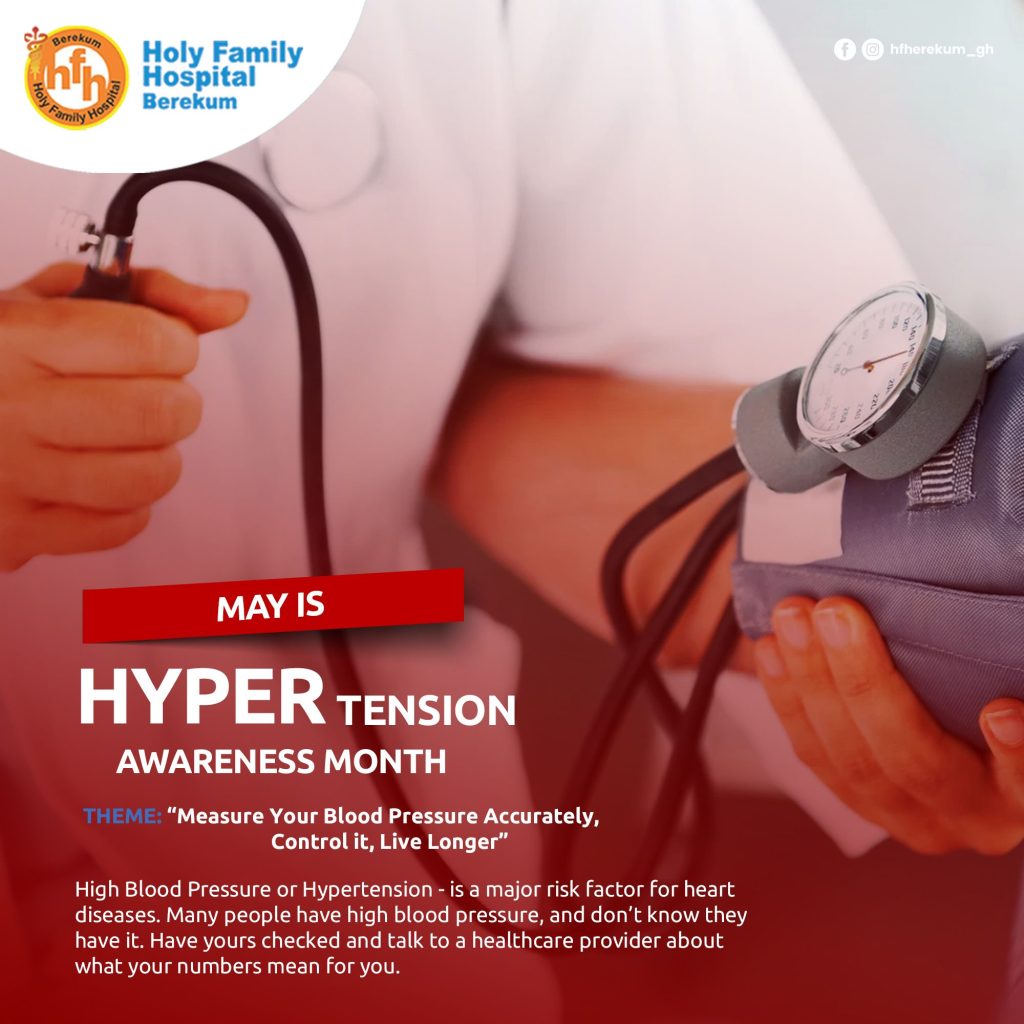
On May 17th, we celebrate World Hypertension Day, a day dedicated to highlighting the importance of monitoring blood pressure and bringing global awareness to the 1 billion people living with high blood pressure worldwide. High blood pressure, also known as hypertension, is defined as a systolic blood pressure consistently above 140 mm Hg and/or diastolic blood pressure consistently above 90 mm Hg. Hypertension is the #1 risk factor for heart disease, stroke, renal complications, and premature death. Usually, high blood pressure alone does not cause any symptoms. Fortunately, hypertension can be prevented and managed, by checking your blood pressure regularly, and through treatment.
Since 2016, CDC and global partners have worked together to create innovative strategies to prevent and control hypertension, and improve people’s overall heart health in countries across the world. Get tested, know your numbers, and live longer.
What is Hypertension
Hypertension, also known as high blood pressure, is a common and often silent condition that affects millions of people worldwide. It occurs when the force of blood pushing against the walls of your arteries is consistently too high. Over time, this can lead to serious health problems like heart disease, stroke, kidney failure, and dementia.
Understanding Hypertension
- Normal Blood Pressure: Blood pressure is typically measured in millimeters of mercury (mmHg). A healthy blood pressure reading is considered to be less than 120/80 mmHg.
- Stages of Hypertension: When blood pressure readings consistently fall within certain ranges, it’s considered hypertension and categorized into stages:
- Stage 1: 130-139/85-89 mmHg
- Stage 2: 140-159/90-99 mmHg
- Hypertensive Crisis: Above 180/110 mmHg requires immediate medical attention.
- Causes: The exact cause of hypertension is often unknown, but various factors can contribute, including genetics, certain medical conditions, unhealthy lifestyle choices (diet, exercise, smoking, etc.), and age.
Risks and Complications
- Uncontrolled hypertension significantly increases the risk of developing health problems like:
- Heart disease and stroke
- Kidney failure
- Aneurysm
- Vision loss
- Dementia
- These complications can be life-threatening, highlighting the importance of early detection and managing hypertension effectively.
Symptoms
Most people with hypertension don’t experience any noticeable symptoms, making it a “silent killer.” This is why regular blood pressure monitoring is crucial for early detection and timely intervention. However, some potential symptoms to be aware of include:
- Headaches
- Fatigue
- Dizziness
- Shortness of breath
- Chest pain
- Blood in the urine
Managing Hypertension
The good news is that hypertension is often manageable with lifestyle changes and, if necessary, medication. Key ways to control blood pressure include:
- Healthy diet: Eating a balanced diet rich in fruits, vegetables, and whole grains while limiting salt, saturated fat, and processed foods.
- Regular exercise: Engaging in at least 150 minutes of moderate-intensity exercise per week.
- Maintaining a healthy weight: Losing weight if you’re overweight or obese can significantly improve blood pressure.
- Limiting alcohol and smoking: Excessive alcohol consumption and smoking can raise blood pressure.
- Managing stress: Stress management techniques like yoga, meditation, or deep breathing can help lower blood pressure.
- Adhering to medication: If medication is prescribed by your doctor, it’s crucial to take it as directed for optimal control.
Early Detection and Prevention
- Regular blood pressure monitoring, especially for individuals at high risk, is crucial for early detection and timely intervention.
- Being aware of potential risk factors and making preventive lifestyle changes can help reduce the risk of developing hypertension.
Remember: Hypertension is a serious but manageable condition. By understanding its risks, symptoms, and ways to manage it, you can take control of your health and prevent future complications.
Significance of World Hypertension Day
- Global Platform: World Hypertension Day has become a major international event, reaching millions of people worldwide with crucial information and promoting prevention and control measures.
- Advocacy for Change: It has spurred policy changes and initiatives to improve access to affordable medication, healthcare services, and public health programs focused on hypertension.
- Empowering Individuals: The Day encourages individuals to take control of their health by knowing their blood pressure numbers, adopting healthy lifestyle choices, and seeking timely medical attention.
- Continuous Awareness: Despite significant progress, hypertension remains a major public health issue. World Hypertension Day continues to play a vital role in raising awareness and promoting global action against this silent threat.
17th May 2024 Special Day
The date of 17th May carries global health significance as we observe World Hypertension Day in 2024. Falling distinctly on this springtime calendar date annually, this commemorative occasion spreads awareness regarding the silent threat of high blood pressure. The unique positioning of this event provides the opportune time to educate millions vulnerable to hypertension worldwide. As international health organizations mobilize on this particular 2024 date, there is renewed momentum for early detection and consistent management of elevated BP levels globally.
Credit: oliveboard.in
